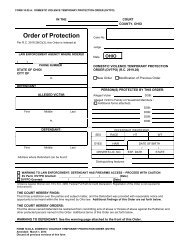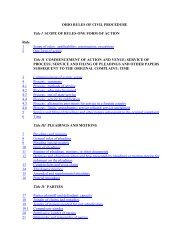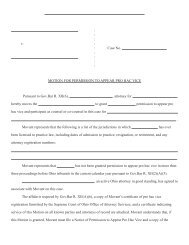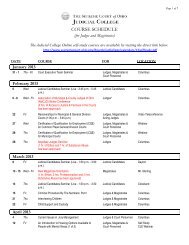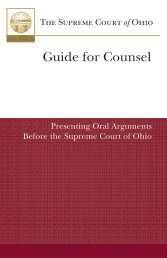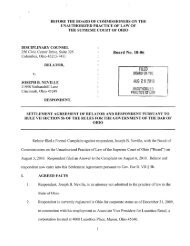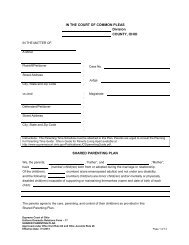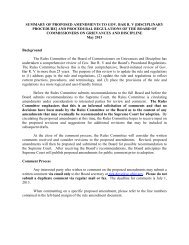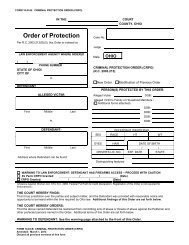disciplinary handbook: volume v - Supreme Court - State of Ohio
disciplinary handbook: volume v - Supreme Court - State of Ohio
disciplinary handbook: volume v - Supreme Court - State of Ohio
You also want an ePaper? Increase the reach of your titles
YUMPU automatically turns print PDFs into web optimized ePapers that Google loves.
Gaul, Disciplinary Counsel v.127 <strong>Ohio</strong> St.3d 16, 2010-<strong>Ohio</strong>-4831. Decided 10/7/2010.Case Summaries- 94Respondent, a common pleas court judge since 1991, made prejudicial and unnecessary comments towarda defendant both before and after the judge decided to recuse himself from the case, and he misused anAmber Alert and the media‘s responsiveness to the alert. All <strong>of</strong> respondent‘s misconduct occurred duringa single criminal trial in which the defendant was accused <strong>of</strong> burglary and assault <strong>of</strong> an elderly womanand her caregiver. On the third day <strong>of</strong> trial, the judge was informed that the detective who was totransfer the women to trial could not locate them. Respondent was concerned for the elderly woman‘ssafety based upon his suspicions that the defendant was trying to prevent the woman from testifying andhis review <strong>of</strong> the dockets from the defendant‘s past criminal cases. He knew that the caregiver hadadmitted that she had a personal relationship with the defendant and had been smoking crack with him onthe day <strong>of</strong> the crimes. He placed his concerns on the record. He granted the states‘ motion for a one- daycontinuance to locate the witnesses and he issued a bench warrant for the caregiver. The next morningat a meeting with attorneys in chambers, respondent learned that a detective was unable to find thewomen and that the prosecutor wanted to dismiss the case. According to the defense counsel respondentwas irate that the prosecutor wanted to dismiss and the judge stated to the prosecutor: ―[W]e are all on thesame team.‖ Respondent informed them he intended to recuse himself when he took the bench.Respondent told his bailiff he was issuing an amber alert to locate the elderly witness and he asked thebailiff to notify the media. Before respondent went on the record, he was notified that the elderly womanhad been located. When he went on the record, in the presence <strong>of</strong> the local media who had come to thecourtroom, he said he asked the media to be here because he thought they were going to need their helpand he still thought that needed their help to find witnesses in the case. He stated he wanted to make arecord. He said that the elderly woman allegedly had her hip broken by the defendant and he outlined thebasic facts <strong>of</strong> the case and that the caregiver had been smoking crack and drinking with the defendantwhen the fight broke out over money and the defendant assaulted the women. Among other things hestated that he bet his life on the fact that the defendant was involve in obstruction <strong>of</strong> justice and atechnical kidnapping. He stated that he thought it important for him to step out <strong>of</strong> his role as judge andbecome an advocate to protect the elderly woman. He asked if the state would like to move tocontinue the case until the caretaker was incarcerated. The judge explained he would recuse himself andthe defendant would stay in jail he challenged law enforcement to find the caregiver and have herincarcerated and to determine whether the defendant was involved in the disappearance <strong>of</strong> the elderlywoman. He said he suspected that they would find that out because he had the defendant‘s rap sheet righthere. The judge denied defense counsel‘s motion to dismiss the case with prejudice. He declared amistrial with respect to jury members who had been selected. He repeated his intention to recuse and thenreturned to his chambers with members <strong>of</strong> the media and made further comments. The board adopted thepanel‘s findings <strong>of</strong> violations <strong>of</strong> former Canons 2, 3(B)(5) and 3(B)(9) and Pr<strong>of</strong>.Cond.R. 8.4(d).Respondent presented several objections to the court, all <strong>of</strong> which were overruled. Respondent objectedbecause the panel did not admit expert evidence about how to interpret the Code <strong>of</strong> Judicial Conduct; butthe court found that the panel was capable <strong>of</strong> interpreting and applying the rules without an expert‘sopinion. The court cited Karto (2002). Respondent objected because the panel refused to admitjailhouse telephone conversations between the caregiver and defendant and he was unable to introduce allrelevant evidence <strong>of</strong> the context in which he made his decisions, but the court found that the respondentwas not even award the recordings existed at the time <strong>of</strong> the trial. Respondent objected to the violation<strong>of</strong> Canon 2, claiming he had a legally sufficient basis for making the conclusion that the defendanttampered with the witness and the elderly woman was in danger, thus justifying his actions. The courtstated that although he may have appropriately recused himself due to his suspicions about the defendant,the recusal did not excuse the highly prejudicial and unnecessary comments directed toward thedefendant before and after recusal. Further, he did not have evidence before him or hold a hearingbefore announcing his judicial findings on the record. Medley (2004). ―A finding <strong>of</strong> fact must be basedon evidence; to find that contemptuous conduct has occurred outside the present <strong>of</strong> the court, the courtmust hold a hearing and analyze record evidence.‖ Respondent used the Amber Alert system to achieve



